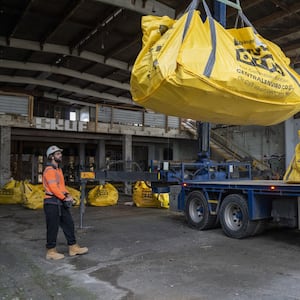Business
Hawke’s Bay Diverts Over 13,000 kg of Plasterboard Waste with New System

Hawke’s Bay has launched an innovative pilot program aimed at reducing plasterboard waste, a significant contributor to landfill accumulation in the building sector. Since the trial commenced in May 2023, the initiative has successfully diverted 13,938 kilograms of plasterboard from landfills, marking a positive step towards sustainability in the region.
According to the 2024 Solid Waste Analysis Protocol (SWAP) report, plasterboard waste constitutes approximately 8% of the total waste tonnage in Hawke’s Bay. This figure underscores the importance of addressing this particular waste stream, which has presented challenges for recycling efforts in the construction industry.
Innovative Approach to Waste Management
The bag-based system implemented in Hawke’s Bay allows for easier collection and processing of plasterboard waste. By utilizing specially designed bags, the program aims to streamline the disposal process, reducing contamination and improving recycling rates. This method not only helps keep plasterboard out of landfills but also supports local recycling initiatives.
Local government authorities have expressed enthusiasm for the pilot program, noting its potential to serve as a model for other regions grappling with similar waste management issues. “This project highlights our commitment to sustainability and the circular economy,” said a representative from the Hawke’s Bay Council. The successful diversion of nearly 14,000 kilograms of waste demonstrates the effectiveness of innovative solutions in tackling environmental challenges.
Future Implications and Community Involvement
The initial results of the plasterboard waste program have prompted discussions about expanding similar initiatives across New Zealand. Community involvement has been crucial to the success of this trial, with local builders and contractors participating actively in the waste diversion process. The collaboration between the government and the construction industry has fostered a sense of shared responsibility, encouraging sustainable practices among stakeholders.
As the pilot continues, further analysis will assess the long-term impacts of the program on waste management and recycling in the region. The insights gained may inform broader policies aimed at addressing construction waste, ultimately contributing to a more sustainable future for the building industry in New Zealand.
By taking proactive steps in waste management, Hawke’s Bay is setting a precedent for other regions to follow. The success of the plasterboard pilot program is a testament to the power of innovation and collaboration in creating effective environmental solutions.
-

 World3 months ago
World3 months agoTest Your Knowledge: Take the Herald’s Afternoon Quiz Today
-

 Sports3 months ago
Sports3 months agoPM Faces Backlash from Fans During Netball Trophy Ceremony
-

 Lifestyle3 months ago
Lifestyle3 months agoDunedin Designers Win Top Award at Hokonui Fashion Event
-

 Sports3 months ago
Sports3 months agoLiam Lawson Launches New Era for Racing Bulls with Strong Start
-

 Lifestyle3 months ago
Lifestyle3 months agoDisney Fan Reveals Dress Code Tips for Park Visitors
-

 Health3 months ago
Health3 months agoWalking Faster Offers Major Health Benefits for Older Adults
-

 World3 months ago
World3 months agoCoalition Forms to Preserve Māori Wards in Hawke’s Bay
-

 Politics3 months ago
Politics3 months agoScots Rally with Humor and Music to Protest Trump’s Visit
-

 Top Stories3 months ago
Top Stories3 months agoUK and India Finalize Trade Deal to Boost Economic Ties
-

 Entertainment3 months ago
Entertainment3 months agoExperience the Excitement of ‘Chief of War’ in Oʻahu
-

 World3 months ago
World3 months agoHuntly Begins Water Pipe Flushing to Resolve Brown Water Issue
-

 Science3 months ago
Science3 months agoNew Interactive Map Reveals Wairarapa Valley’s Geological Secrets









